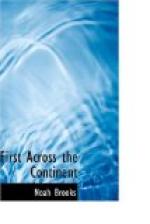“We were soon supplied by Drewyer with a beaver and an otter, of which we took only a part of the beaver, and gave the rest to the Indians. The otter is a favorite food, though much inferior, at least in our estimation, to the dog, which they will not eat. The horse is seldom eaten, and never except when absolute necessity compels them, as the only alternative to dying of hunger. This fastidiousness does not, however, seem to proceed so much from any dislike to the food, as from attachment to the animal itself; for many of them eat very heartily of the horse-beef which we give them.”
On the first day of May, having travelled forty miles from their camp near the mouth of the Walla Walla, they camped between two points at which are now situated the two towns of Prescott, on the south, and Waitesburg, on the north. Their journal says:—
“We had scarcely encamped when three young men came up from the Wollawollah village, with a steel-trap which had inadvertently been left behind, and which they had come a whole day’s journey in order to restore. This act of integrity was the more pleasing, because, though very rare among Indians, it corresponded perfectly with the general behavior of the Wollawollahs, among whom we had lost carelessly several knives, which were always returned as soon as found. We may, indeed, justly affirm, that of all the Indians whom we had met since leaving the United States, the Wollawollahs were the most hospitable, honest, and sincere.”
Chapter XXI — Overland east of the Columbia
It was now early in May, and the expedition, travelling eastward along Touchet Creek, were in the country of their friends, the Chopunnish. On the third, they were agreeably surprised to meet Weahkootnut, whom they had named Bighorn from the fact that he wore a horn of that animal suspended from his left arm. This man was the first chief of a large band of Chopunnish, and when the expedition passed that way, on their path to the Pacific, the last autumn, he was very obliging and useful to them, guiding them down the Snake, or Lewis River. He had now heard that the white men were on their return, and he had come over across the hills to meet them. As we may suppose, the meeting was very cordial, and Weahkootnut turned back with his white friends and accompanied them to the mouth of the Kooskooskee, a stream of which our readers have heard before; it is now known as the Clearwater.
Captain Lewis told Weahkootnut that his people were hungry, their slender stock of provisions being about exhausted. The chief told them that they would soon come to a Chopunnish house where they could get food. But the journal has this entry:—




